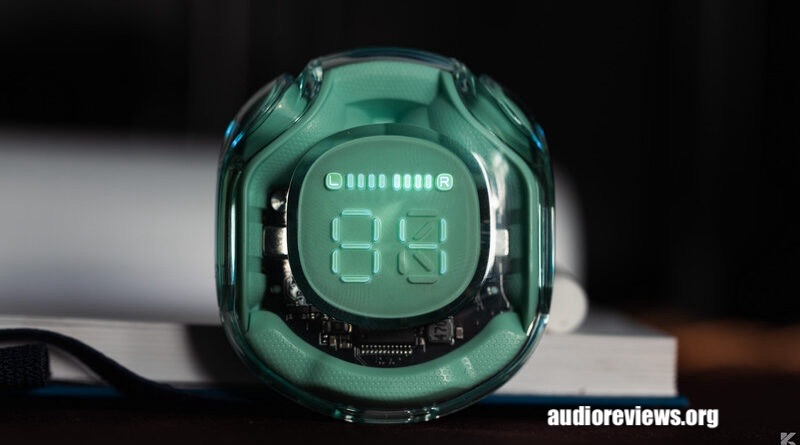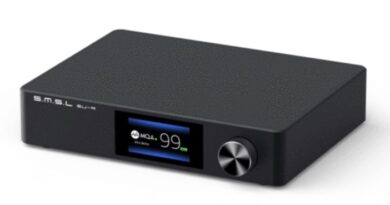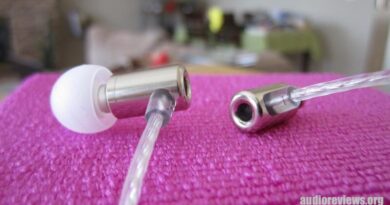Acefast T8 Review – Stunning Looks, Mainstream Sound
Pros — Unique design and aesthetics
– Good battery life
– Solid Bluetooth connnectivity
– Good microphone performance
– Surprisingly decent soundstage
Cons — Acefast T8 have somewhat uncontrolled bass response
– V-shaped tuning might not appeal purists
– Too much sub-bass adds haze to mids
– No Active Noise Cancellation
– No higher bitrate codec support
– No app support
In this Article
INTRODUCTION
I primarily associate Acefast with its range of high quality chargers and power banks. So when the brand approached me to try the T8, perhaps the highest “specced” TWS IEMs in the current lineup, I was a bit on the fence. One look at the design had me hooked, however, as the Acefast T8 have a distinct design language that sets them apart.
A good design is only as good as the sound, so let’s see what tuning decisions Acefast took, and how those have shaped the final product.
Note: the ratings given will be subjective to the price tier. Acefast was generous enough to send me the T8 for review.
Sources used: Pixel 4 XL
Price, while reviewed: 60 euros. Can be bought from Amazon.
PHYSICAL THINGS AND USABILITY
PACKAGING AND ACCESSORIES
The packaging of the Acefast T8 is as “radiant” as the IEMs themselves. Inside, you get the basics (eartips, type-C cable, carrying case with the IEMs inside) and a silicone “bumper” for the case. The silicone case offers basic protection from drops and scratches.
BUILD QUALITY
The transparent shell, the under-glow of the LEDs, the sense of depth underneath the battery indicators, and the playful colors – all of them coalesce to form a striking first impression.
Given the transparent nature of the shell, it’s no surprise that the Acefast T8 is entirely made out of polycarbonate (or plastic, in more colloquial term). I dropped the buds accidentally a few times and there were no scratches or dents on the shell so the overall build is fairly sturdy.
The back of the IEMs house the vent and mic, while the stem has a capacitive touch layer on top. There is another microphone on the inner side that aids in noise cancellation when making calls. Note that this is not a mic for Active Noise Cancellation that blocks you from outside noise.
The earbuds are secured in the case via strong magnets and won’t fall out even when vigorously shaken. Overall, excellent build quality and the unique aesthetics set the Acefast T8 apart from the competition.
COMFORT, ISOLATION, AND FIT
The comfort is excellent as the earbuds sit firmly in the ears, once you have picked the right eartips that is. I found that the stock eartips were a bit on the “thin” side when worn, so I had to go a size larger than usual for the best seal and stability.
SOURCE AND EARTIPS
I used the Acefast T8 with Pixel 4XL and the stock eartips.
DRIVER SETUP
Acefast T8 utilize a dual-dynamic driver setup where one 10mm driver is in charge of the bass and another 6mm driver produces the upper-mids and high frequencies. The drivers are arranged coaxially and I assume that there is some frequency-overlap between them (so no fully isolated “frequency bands” for each driver).
TONALITY AND TECHNICALITIES
The Acefast T8 have a bass-boosted, V-shaped tuning. One look at the graph and you know that bass dominates the scene, especially sub-bass frequencies.
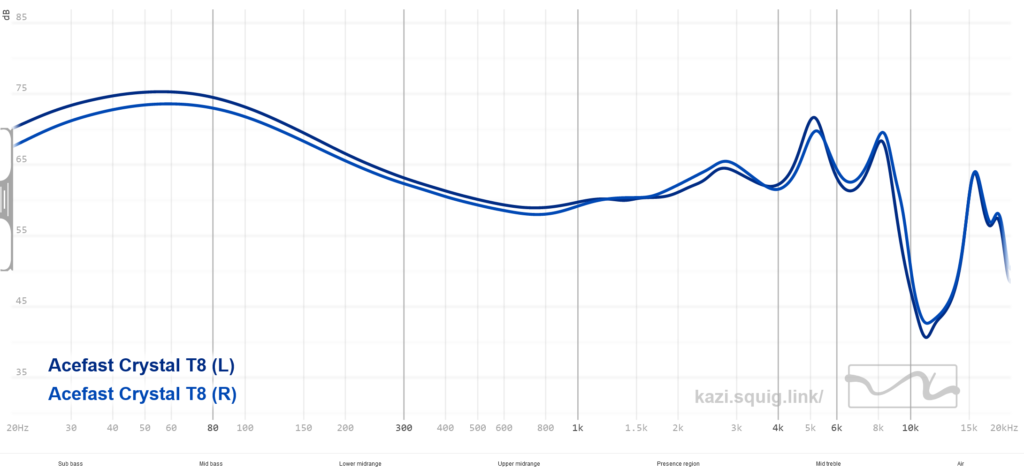
Due to this over-emphasis of sub-bass, the lower-mids sound somewhat hazy and undefined. Male vocals can sound a bit drowned out, with subtle articulations being lost. Female vocals are less up-front than your usual Harman affair, but on the flip-side, high-pitched vocals sound smoothed out and lush. No shout or shrillness here which is a plus.
The lower-treble emphasis is mostly unnoticeable due to the bass boost, but can be felt in tracks with sparse bass or mostly vocals and string instruments. Treble has a metallic sheen in those instances at the expense of clarity. This peak is needed though to cut-through some of the sub-bass haze, so keeping this region down while pushing the bass high will make the T8 sound even darker.
Upper-treble is mostly muted, as the trailing-edge of cymbal hits and hi-hats tend to disappear abruptly. Soundstage is surprisingly “open” in its presentation, with stage depth and width being fairly impressive for a pair of budget TWS IEMs. Imaging is not as well-defined. Spatial cues are often difficult to pinpoint in the stage.
Macrodynamic punch is pretty good as strong bass-lines and sudden bass drops are further accentuated. Microdynamics (subtle shifts in volume) are not as evident as the strong sub-bass tends to throw off these subtle details.
SELECT COMPARISONS
vs Soundpeats Engine4
Soundpeats Engine4 are priced similarly to the Acefast T8 and have a very different design. While the T8 adopt the half in-ear look, the Engine4 are the traditional bullet-style in-ears. The build and design are far more enticing on the Acefast T8 as the Soundpeats IEMs have a fairly generic design. Battery life is also superior on T8.
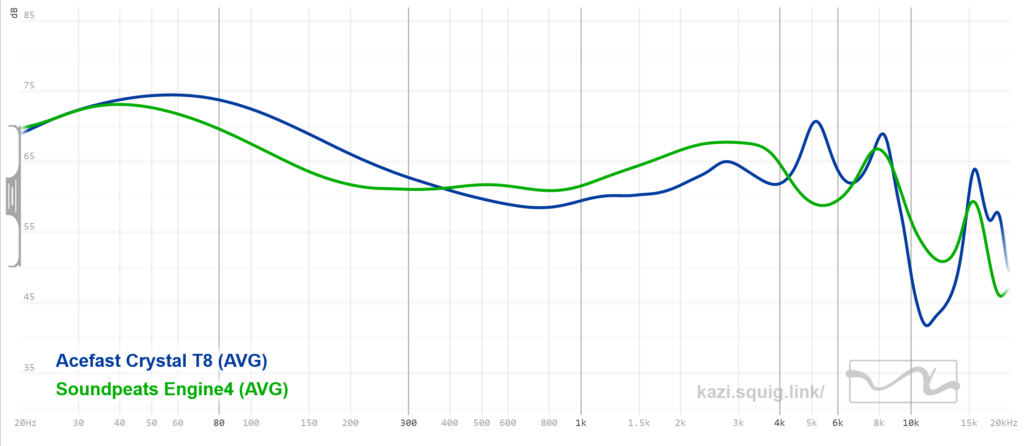
When it comes to the sound, Engine4 have a more neutral tuning profile. The sub-bass boost is controlled, while the lower-treble has some dips in it to reduce sibilance and recording artifacts.
Moreover, thanks to the app support on the Engine4, you can tune the sound even further. The T8 do have better battery life, and the bassy tuning can be fun to listen to when on the go. Soundstage is also better on the T8 while Engine4 have better imaging.
Oh, and the Engine4 have ANC (doesn’t work much) and full-fledged app support.
My personal tuning preferences align more with the Engine4. Acefast T8 is a bit too “mainstream” for my tastes, but I found them to be fairly decent for commute and casual listening.
Quality of life features
So, let’s talk about all the non-sound stuff that we have left out so far.
- Battery life is very good, with the buds not draining much charge when put in the case.
- Mic performance is excellent. In crowded areas, the voice can come through somewhat compressed, but speech intelligibility is unaffected.
- There is no app support on the Acefast T8 which is a huge bummer
- The controls cannot be remapped but stock controls work fairly well, as long as you keep your hands dry (those touch sensors go bonkers with water on them).
CONCLUDING REMARKS
Acefast has nailed the design and overall aesthetics of the T8. That being said, the tuning needs some extra work. A more controlled and even-handed bass response would automatically fix many of my issues with the T8.
For the next release, I hope that the overall quantity of the sub-bass is reduced and the lower-treble is further reigned in. App support would be a great bonus, so would be the inclusion of ANC.
The Acefast T8 enter a crowded market but manage to stand out thanks to their design. Some more refinement in the tuning would make them a solid contender for the “best under USD$100” bracket. Until then, if you find the T8 on a good deal and mostly care about the sub-bass, they can very well be your next purchase.
DISCLAIMER
Get it from Amazon US, Acefast Official Store
Our generic standard disclaimer.
You find an INDEX of our most relevant technical articles HERE.



